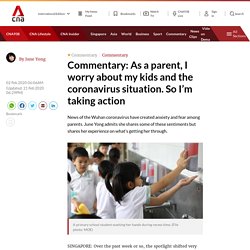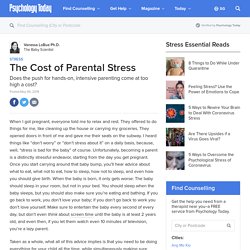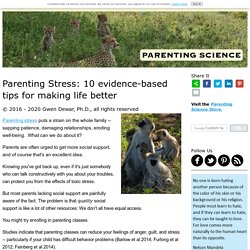

Parenting Stress - Psychology - Oxford Bibliographies. Introduction Parenting stress is a normal part of the parenting experience.

It arises when parenting demands exceed the expected and actual resources available to the parents that permit them to succeed in the parent role. Hypotheses regarding the formation and maintenance of parent-child relationships, and regarding daily “hassles,” predominate in theories of parenting stress. Relationship-focused theories place the emphasis on parenting stress that arises from various domains, including the parent herself or himself, the child, and the qualities of their dyadic relationship. Hassles-focused theories place the emphasis on the various mild to moderate stressors that arise in a typical day or week in the life of a household with young children or adolescents. The authors were supported by NIMH grant R01 MH 99437 and NSF grant DRL-1118571 during the preparation of this article. General Overviews. As a parent, I worry about my kids and the coronavirus situation. So I’m taking action. SINGAPORE: Over the past week or so, the spotlight shifted very quickly from Chinese New Year festivities to the deadly coronavirus.

As a parent with three kids in primary school, I couldn’t help but feel on the edge as the day to return to school post-CNY drew near. News about the compulsory leave of absence (LOA) for teachers and students returning from China helped settle the jitters somewhat but did not remove it completely. I was also in a dilemma. As my second child was still recovering from a flu bug, I wasn’t entirely sure whether he was well enough to return to school. In the end, I kept all three at home on the first day. To be absolutely honest, I’m not sure if it was more responsible parenting or paranoia driving that decision.
Apparently I wasn’t the only one who was gripped by fear, as a few of my daughter’s classmates were absent on that day too. What kind of message would I be sending my kids if I allowed fear to steer my every course? Psychology Today Singapore. When I got pregnant, everyone told me to relax and rest.

They offered to do things for me, like cleaning up the house or carrying my groceries. They opened doors in front of me and gave me their seats on the subway. I heard things like “don’t worry” or “don’t stress about it” on a daily basis, because, well, “stress is bad for the baby” of course. Unfortunately, becoming a parent is a distinctly stressful endeavor, starting from the day you get pregnant. Once you start carrying around that baby bump, you’ll hear advice about what to eat, what not to eat, how to sleep, how not to sleep, and even how you should give birth. Article continues after advertisement Taken as a whole, what all of this advice implies is that you need to be doing everything for your child all the time, while simultaneously making sure you’re a well put-together and fully present parent, who in many cases also has a full-time job. Research supports this contention. Source: innerwhispers/Pixabay. Parenting stress: 10 evidence-based tips for making life better.
© 2016 - 2020 Gwen Dewar, Ph.D., all rights reserved Parenting stress puts a strain on the whole family -- sapping patience, damaging relationships, eroding well-being.

What can we do about it? Parents are often urged to get more social support, and of course that's an excellent idea. Knowing you've got back up, even if it's just somebody who can talk constructively with you about your troubles, can protect you from the effects of toxic stress. But most parents lacking social support are painfully aware of the fact. You might try enrolling in parenting classes. Studies indicate that parenting classes can reduce your feelings of anger, guilt, and stress -- particularly if your child has difficult behavior problems (Barlow et al 2014; Furlong et al 2012; Feinberg et al 2014).
However, the effects usually fade after the classes end -- suggesting that it's the ongoing social connections that matter. 1. It's natural to look for patterns. Stress makes people zero in on the bad stuff. 2. 3.